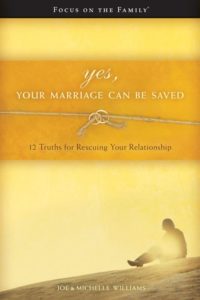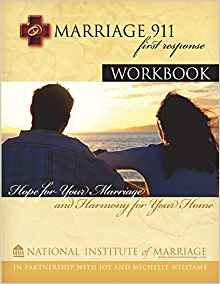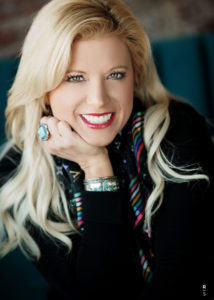STORIES CAN SOMETIMES BE A BETTER TEACHING TOOL than mere words of instruction. So today, for you women who want to save your marriage, I want to tell you the story of Wendy. This is a sad story, but sometimes sad stories can show us the way to happier endings.
When Wendy’s husband left, her world fell apart. She never saw it coming. Her husband had been a loving and caring provider. Now suddenly, he said he was leaving. Her mind spun in confusion as she watched him pack up his things. Her heart raced.
“Where are you going?” she asked. “Why are you doing this?”
He shook his head and nuzzled the head of their dog, then headed toward the door.
She grabbed his arm. “I don’t understand. Why are you leaving? When are you coming back?”
“I’m sorry. I just can’t do this anymore. I need a break.”
As he reached for the door handle, tears began streaming down her face. “I can’t believe you’re doing this! Why are you leaving? Where are you going?”
“I’m sorry. I’ll give you a call.” The door closed firmly behind him and soon she heard the car engine roar to life. From the window, she watched his truck pull out of the driveway and head down the street. Wendy stood watching for a moment in shock, then collapsed on the couch.
For the next several days, Wendy walked around like one of the living dead. Her mind was in a fog. She was heartbroken. She called a couple of her friends. They were shocked too, but didn’t know what to say. She called her husband on the phone, hoping he would explain, but his answers were vague and unsettling. She suggested counseling, but he said he couldn’t do it right now. He wouldn’t know what to say.
With the shock and heartbreak of her husband’s sudden departure, Wendy’s reactions were very normal at this point.
But after the initial pain, she had a choice. What direction would she take from this point forward?
A Wrong Direction
Wendy could not push back the pain of her emotions and they began to spiral out of control. Her mind spun in every direction with fears, anger, regrets. For days she’d lie in bed, too depressed to even get up to dress and comb her hair or take calls from friends who wanted to help. The best she could do was nibble on some crackers, feed the dog and let him out in the backyard when he needed to go outside. She could think of nothing except the terrible pain her husband was causing her, and as her emotions changed from day to day—sometimes from hour to hour—she called her husband. Sometimes she called to beg him to come home, other times she sobbed on the phone, asking what was to become of her. More than once, she sent long texts lashing out at him, accusing him, berating him, telling him what a terrible person he was.
“How can you do this to me? How can you treat me this way!” she asked. She called mutual friends and asked them to call too.
Finally, one of Wendy’s friends suggested she take a class at church for those whose marriages were in crisis. Wendy went, and for the first time, she experienced hope.
A New Opportunity
She was told if she wanted to save her marriage, “you need to give your husband space – to put your husband on the back burner and focus on God.” Leaders told her to pray for her husband, say positive things to him when they had contact, and refrain from criticizing him. This was a time for her to put aside all expectations from her husband and simply be a giving, positive friend to him. She was even encouraged to take care of herself and do things she enjoyed without her husband. The other women in her group were dealing with similar situations, and she found the group atmosphere to be encouraging.
She began doing many of the things she was told to do, and her husband began to respond in positive ways. He even began dropping by the house on occasion, admitting to her that he still loved her but felt suffocated by her neediness.
She tried to put into practice the things they talked about in her class, but it was hard. In fact, one thing she just couldn’t do. The women were told to “let go” of their spouses, not to expect anything from them, and trust God with their emotions. She just didn’t understand how to do this. She loved her husband. She wanted him back. She wanted him to love her. She couldn’t let go of him and tell God she would be alright if her husband didn’t come back. She knew for a fact that she wouldn’t be alright if her husband didn’t come back. She needed her husband in her life. Yes, God was good and powerful, but He wasn’t a substitute for her husband. She couldn’t take a chance on letting go of her husband.
One evening her husband came over to visit, but instead of focusing on her and talking with her, all he did was play with their golden retriever. Her initial pain of abandonment returned. Self-pity took hold. But instead of taking her feelings to God to lay the pain at his feet, she just couldn’t keep from saying what was on her mind. “You love the dog more than me,” she complained to her husband.
Her husband didn’t respond but continued playing with the dog.
Although Wendy knew the importance of letting go and keeping things positive when she spent time with her husband, once again her emotions pulled her off balance. She couldn’t resist expressing her dissatisfaction with her husband’s lack of attention. The need for her husband’s love and affirmation held her hostage to her emotions. Her neediness was driving him away. Surrendering her pain to God would have released her from her obsession, providing God the opportunity to breathe a new sense of freedom, love, and commitment into her husband’s heart. But she couldn’t let go and slowly lapsed back into her former pattern of accusing him and pleading with him to come home.
Eventually, her husband stopped coming by. He went days without returning calls and texts. Her broken heart lay in pieces as the relationship slowly ebbed away.
Doesn’t Have To Be This Way if You Want to Save Your Marriage
I hate these sad endings because I know there’s a better way. If you want to save your marriage, the answers lay in the hands of our loving Father. He has a plan for us. He knows where our path will lead. He knows our needs and the needs of our partners. And He can put it all together. But we have to trust Him. We have to lay it all at His feet. We need to surrender our spouses, our marriages, our circumstances, to Him and let Him take control. Then we need to step back, wait, and trust Him for His timing while staying tuned for His voice and following His lead when He tells us to act. While we wait, He will build us up and give us His strength so we are stronger than we were before, strong enough to handle whatever comes our way. Isaiah 40:31 assures us, “Those who wait on the Lord will renew their strength. They will mount up on wings like eagles. They will run and not grow weary. They will walk and not faint.”
There’s another story with a happier ending I invite you to read as well. A true story I posted on Heart Talk in the past . . . the story of Marta. If you want to see a story of success, a story where the woman took the right path, surrendered her marriage to God, and ended up restoring her marriage, Marta’s story is a story that will encourage you as you take steps to save your own marriage..
Yes, unfortunately, we need to acknowledge the fact that our marriages may not survive. We may not be able to save our marriage. Our spouses’ heart may not turn back. God allows them to have free will and make their own decisions. But when placing our situations in the hands of our loving Father, He will make all things new for us and give us a new beginning—either with our partner or by taking us down a new and equally fulfilling road that He prepares for us when we continue to follow His lead.
“I know the plans I have for you, declares the Lord, plans to prosper you and not to harm you, plans to give you hope ad a future.” Jeremiah 29:11.
Next week: The Challenge of Letting Go
If you want to save your marriage, I encourage you to get my book, Fighting for Your Marriage while Separated. It will walk you step by step through the labyrinths of this difficult journey so you can find the happy ending you are looking for.



















